Digital sovereignty - steps towards a new system of internet governance
Introduction
Will digital sovereignty spell the end for the free web ?
Restoring the scope of political and economic sovereignty through law and trust
Recommendations for regulated internet governance
Summary
Just how omnipotent will GAFA become in terms of accessing and processing our personal data? The convenience of voluntary servitude comes at a price – the exposure of our habits, purchasing and health.
Since the Wikileaks revelations, the commodity of data has become a resource coveted and envied by governments and companies. A new ecosystem has sprung up in response to the unbridled race for this prized commodity pitting the ‘circles’ of citizen, government and corporate sovereignty against one other. Is anyone capable of imparting a message of individual freedom without hitting a wall of powerful multinationals?
At a time when the European Union is refining its data protection policy, the rules of a fledgling system of governance are being shaped every day by a new balance of power.
The issue of personal data protection, a fundamental right guaranteed by Article 8 of the Charter of Fundamental Rights of the European Union, both in and outside of European territory, has refocused attention on the urgent need to define an international framework of sovereignties.
With the European Commission’s recognition of the Privacy Shield on 12 July 2016 and the Safe Harbour framework pledging equivalent protection of data outside the European area, a new system is emerging in a fierce and competitive environment reflecting the sudden yet necessary realisation that the age of the Internet with its innate freedoms has come to an end.
Farid Gueham,
Public sector consultant and contributor to the Fondation pour l’innovation politique on digital issues and innovation.
The concept of ‘digital sovereignty’ arose in the early 2000s. Pierre Bellanger, the CEO of French radio station Skyrock, made an initial attempt to define it in 2011: ‘Digital sovereignty is control of our present and destiny as manifested and guided by the use of technology and computer networks1.’ The quest for digital sovereignty is therefore a goal shared by companies, public authority stakeholders and, more recently, Internet users, citizens and consumers. At the consultations of the French National Digital Council of 2014, several proposals emphasised the critical role played by strong digital sovereignty in national sovereignty2. Faced with the ever increasing economic influence of GAFA (Google, Apple, Facebook and Amazon)3, economic dependence and significant value transfer are feeding an imbalance which requires public authorities and economic operators to implement regulatory tools that are compatible with free movement and freedom, which are inseparable from our online practices.
GAFA has collectively made us accustomed to voluntarily waiving our rights regarding personal data. In return for relinquishing these rights, we receive a first-rate service at the cost of an alarming degree of vagueness regarding the future of our personal data. Consumers or users of services have grown used to waiving their rights without truly understanding the implications and repercussions of their actions for their personal data. This pattern of behaviour is gradually being replaced by a less automatic response. Some companies have taken stock of these changing attitudes and adapted their services, eager to retain the trust of consumers wishing to regain control of their data.
A Harris Interactive survey from March 2016 revealed that although two thirds of French people expect companies to offer them more tailored services, only a third are prepared entrust these companies with their personal data to achieve that end: “Ultimately, against the current backdrop of fragmented information, which often correlates with an attitude of mistrust or even rejection of big data, only 15% of French people consider big data as an opportunity for consumers due to its ability to better identify their requirements, while 81% believe that it puts consumers at risk of being ‘tracked'”4.
Faced with such mistrust from users/consumers, companies are committing5 to more ethical and virtuous practices, notably by implementing privacy policies in order to meet new requirements in terms of confidentiality, transparency, support and security of data processing. Ethical data processing poses a challenge in terms of sovereignty, requiring the introduction of an appropriate legal framework, as reflected by changes in European laws6, which already offer some of the best protection worldwide with regard to these issues.
As far as governments are concerned, the battle for data sovereignty is well under way and campaigns are conducted with varying degrees of success. In 2009, the French government funded two sovereign cloud projects, Cloudwatt and Numergy, which emerged from the Andromède programme. New companies were set up, which, in the case of Numergy, were supported by SFR and Bull, while Cloudwatt was forged from a partnership between Orange and Thales7. Their goal was to provide companies and the French authorities with remotely accessible and secure computing infrastructure capable of hosting data and applications. However, due to a lack of cooperation between manufacturers, the two entities were unable to achieve the initial goal of a ‘sovereign cloud’ despite the government’s insistence on supporting a project with an unclear roadmap. This attempt is a clear illustration that innovation and competitiveness cannot be decreed and must be planned and prepared. Companies have taken this on board and consequently adapted their services and internal structure. This is particularly true of those whose business relies on data processing, the cornerstone against which the concepts of sovereignty and trust rest. So how can this rationale of data capture by companies or governments be neutralised without balkanising a network whose very essence lies in the free movement of information? The protection of citizens’ rights and confidentiality of consumers’ information is at stake. Following an adolescence of experimentation and blind optimism, are we seeing the Internet growing up and the advent of an age of reason shaped by disillusionment and disenchantment with blind faith in the great borderless network? The balance of power between governments, citizens, companies and consumers is forging a new Internet of sovereignties, a new space whose rules remain to be defined. Several ‘circles’ of sovereignty are pitted against one another in this environment. The first concerns personal data8, which citizens are free to grant or entrust to partners. It also relates to data that citizens pass on to the government and certain authorities. However, there is no guarantee for users paying their taxes online that their data will not be retrieved by hosts. In this first circle, the government’s main duty is to protect citizens and their data. The second circle concerns the sovereignty of companies and organisations through data, which are companies’ main resource and constitute their added value. The third and final circle concerns the sovereignty of States who, faced with the giants of the web, are only able to influence the debate on data protection within regional entities such as the European Union, whose position and protection mechanisms are being increasingly asserted against American hegemony. How is this new balance of power defining the rules of a fledgling system of governance?
Will digital sovereignty spell the end for the free web ?
Ibid.
See also, Bruce Schneier, Data and The Hidden Battles to Collect Your Data and Control Your World, W.W. Norton & Company, March 2015.
Somewhere between the ideal of the free web and a climate of threats and surveillance, balkanisation of the network is currently under way
Debates on filtering and fragmentation of the network mark the origins of the concept of Internet ‘balkanisation’. These are closely linked to policy and national security issues as well as tensions surrounding the coordination of legal frameworks. We are clearly witnessing a challenge to the multi- stakeholder model of Internet governance. States’ increasing desire to provide a political framework both for use and content reflects this state of affairs, as does the commercial pressure applied by GAFA whose commercial interests are closely linked to digital compartmentalisation of content.
A balkanised Internet is uncharted territory with a system of governance in which States seek to assert or even impose their rules on a politically, technically and legally supervised cyberspace. But to what extent can national interference prompted by recent challenges to US online supremacy be legitimised or tolerated?
The concept of ‘balkanisation9‘ covers a complex reality, with multiple and often contradictory fragmentation and opening processes occurring at different physical or legal levels of the network. Hence the difficulty in defining a French or European sovereignty strategy either for political or commercial issues. Moreover not one but several cyberspaces exist – the ideal of a free, open and universally accessible cyberspace seems to be undermined every day, not just by the political and economic tensions that infiltrate it, but also by an organisational structure that is more complex than it seems. The global Internet is composed of cultural and regional subsets and shaped by practices that differ from region to region. But in this fragmented Internet, US supremacy is still strong in terms of technical and infrastructure resources as well as content originating in America. The same applies to the military, intelligence and the legal framework of contracts. On the basis of the ‘extraterritoriality10‘ principle, it was possible to extend and disseminate this power to other countries until the Wikileaks revelations.
Weakness acknowledged and surveillance revealed – the Snowden scandal
The Snowden case marks a turning point in terms of the challenge to US supremacy. It revealed technological flaws while cyberspace found a new centre of power in emerging countries, especially in Southeast Asia. The scandal also showed the limits of increasingly contested US sovereignty. Political awareness significantly increased as a result of the Wikileaks revelations. The expression of this technological, political and legal activism laid the foundations of an appetite for shared digital sovereignty. In this version of sovereignty, the emphasis was on maintaining the respect, integrity and confidentiality of data in the face of increasingly covetous governments and Internet giants. However, this urge to regain sovereignty is at odds with the imperatives of international cooperation, for instance in the fight against cybercrime. The revelations came as an electric shock to Europe, which was determined not to be pushed around any more, even if this meant going on the counter-offensive.
Initial European retaliations and Safe Harbour
Safe Harbour was the perfect example of overlapping sovereignties, providing the basis for the keenly anticipated legal data transfer system, Privacy Shield, which offers a framework for data transfer between Europe and the US. When Safe Harbour was invalidated by the Court of Justice of the European Union (CJEU) on 6 October 2015, this shield temporarily allowed companies to continue business while awaiting the implementation of a new framework. Over 4,000 companies including GAFA and numerous European SMEs had used Safe Harbour for fifteen years. A second version was planned to correct the limitations of the initial agreement. Under criticism from the CJEU, which condemned the intrusion of US security agencies in the access and processing of European citizens’ personal data once the data were transferred to their territory, America was therefore forced to go back to the drawing board. Europe wanted to protect its citizens and their fundamental rights, while the US protected its economic champions and their growth. The invalidation of the transatlantic Safe Harbour agreement by the CJEU was therefore a major step. In the same spirit, the decision taken by the German data protection authority, BfDI (the German Federal Data Protection Authority11), to suspend data transfer to the United States and ask companies operating in Europe to only store their data within the territory of the European Union, laid the foundations for data processing practices that showed greater respect for the sovereignty of States and citizens. The protection and legal supervision of data gradually became a key factor in European digital policy as data established itself as the new commodity.
Data – the new political and economic commodity
Data is becoming established as the web’s new commercial commodity and an increasing variety of online services is further fragmenting cyberspace, thus undermining the neutrality of the net12. In contrast, it is entirely in Internet companies’ interests to maintain and preserve an open and interoperable environment with a view to developing and expanding their commercial activities. However, the balkanisation of the web is not a one-way street – it is the consequence of friction between the sovereign aspirations of States, private stakeholders, companies and citizens. Whatever the cause, these initiatives and claims are fragmenting the web and penalising all stakeholders.
From a business perspective, the boom in Internet and mobile device use and the advent of connected and smart objects have firmly established the commodity of data as a new commercial weapon. Essentially, its value lies not in raw data but in the added value of processing in accordance with companies’ requirements. Every day, we receive over 2.5 trillion bytes13 of data in a highly diverse range of formats including e-mails, text messages, posts on social media, videos, GPS data and measurement indicators from our sensors. Described by some as the new oil, data is providing business with a strategic challenge and big data is viewed as the most appropriate tool for efficiently processing this tsunami of data. Indeed the potential of big data is almost prophetic: the ability to process a mass of raw data to create competitive leverage for companies. From a customer perspective, data processing should in theory refine their experience and interaction with companies in a way that is tailored closely to their requirements. Finally, from an operational perspective, big data should enable more dynamic and smoother management of the value chain.
However, data processing comes with its own set of concerns. As Bernard Benhamou, Secretary General of the Institute of Digital Sovereignty points out, recent debates regarding an amendment adopted14 in connection with the French Digital Act reveal two analytical errors regarding the nature of industrial and technological realities facing France and Europe15. The amendment provides for the creation of a ‘Commission for Digital Sovereignty’ whose main duty would be to promote the creation of a sovereign operating system (OS). The notion of developing a sovereign operating system is appealing although largely unviable due to the number of barriers facing the project – although mobile OS are currently the industrial gold standard, they will soon be overtaken by new generation operating systems developed based on connected objects, thus bypassing our mobile terminals. ‘At best, the idea that a national initiative (as opposed to a European one like the GSM standard) might provide a credible alternative falls within the realm of pious wishes’, asserts Bernard Benhamou16.
The second weakness of the amendment is the notion of the government creating sovereign encryption tools. The purpose of these tools would be to protect citizens’ and companies’ data through message and data encryption for which only the government would hold the keys. However, as the Snowden case demonstrated, State initiatives aimed at controlling all means of encryption invariably have perverse effects – flaws that are created deliberately may also be exploited by terrorist groups17.
Companies, States, users – who should govern the Internet?
Who actually governs the Internet? It is difficult to provide a definitive response to this question since so many thousands of people are involved in the interactions that animate the network. Indeed a distinction should be drawn between the government or governance of the Internet and its political and legal equivalents, and management of the Internet, which is more associated with technical aspects of the network. In fact, technical decisions stem more or less directly from political choices and conversely, these political decisions are affected by technical limitations. This cross-influence is a cause of concern and tension in terms of both stakeholders’ freedom and users’ sovereignty. Consequently, ‘Internet governance’ operates based on a ‘multi- stakeholder’ model involving States, civil society, companies and international organisations. The Internet Corporation for Assigned Names and Numbers (Icann18) and Internet Engineering Task Force (IETF) define some of these technical aspects, namely network protocols, jointly with the World Wide Web Consortium (W3C), which is responsible for web standards. American pre-eminence, the supposed guarantor of a single, open and decentralised network has now been widely contested for several decades. At the 2012 World Conference on International Telecommunications in Dubai19, several countries, including China, Russia and Saudi Arabia challenged American domination and advocated the ‘sovereign right’ of governments to ‘regulate the national segment of the Internet’. This attempt failed since Europe and the United States firmly opposed it. ‘The architecture of the Internet has become both a major security issue and an issue of sovereignty. For a State, the very fact that power over a technical resource such as a top-level domain name is held by another State is a problem’, explains Bernard Benhamou20.
But what if the real battle were taking place outside Icann? This is a legitimate question, especially since Christopher Mondini, the institution’s vice-president, stated that the obligatory reform of the agency was aimed at ensuring a system protected against State interference. However, we should not overstate the influence of an institution that is still relatively unknown to the public and whose prerogatives are rather limited in terms of handling attacks from States suspected of network censorship or surveillance, or indeed faced with GAFA’s ambitions. Nevertheless, in political, legal and symbolic terms, the institution will no doubt have a role to play in defining digital sovereignty.
National security and the fight against cyberterrorism
Since the 9/11 attacks, jihadi organisations have significantly honed their web strategies. Cyberterrorism is a genuine threat for both nations and companies. Moreover, cyberterrorist attacks can also originate from States. It is clear from such phenomena as the Russian attack on Georgian computer systems21 and the work of Syrian pro-Assad hackers that terrorists are determined to use the net as a means of conducting their offensives. States are faced with abundant threats such as hacking of telecommunication facilities and sensitive infrastructure such as airports, stations, underground train networks, etc. And although cyberterrorist attacks are discreet, they are no less harmful because of this. To date, they have only undermined the image of government sovereignty, but what happens when two trains are diverted from their routes, making this new threat a very real part of citizens’ everyday lives?
Concrete measures for fighting cyberterrorism
Since 2003, cybersecurity has been presented in France as a government priority as reflected by the new focus given to the security services, police and Gendarmerie, starting with the Central Directorate of Interior Intelligence (DRCI), which treats Internet surveillance as a priority. Despite vague attempts at international cooperation and an exchange of data and best practice at European level, the government still responds more slowly than the terrorists. At present, cyberspace is viewed more as the instrument than the target of terrorist acts. However, it is now clear that terrorist movements such as Al-Qaeda and Islamic State have the technical means of conducting attacks on computer systems. And although these networks are currently not sufficiently interconnected to hack vital sectors of the economy, the terrorists are increasingly focusing on these types of targets.
The fight against terrorism raises not only the issue of funding but also citizens’ sovereignty and the delicate balance between excessive common-law powers of surveillance and respect for civil rights.
Since the 9/11 attacks, the threat of cyberterrorist strikes has been on the rise. Although attacks on the physical world have not abated, as the series of attacks on French soil in the past two years have shown, cybersecurity experts are seeking to limit the impact of the threat by establishing a ‘Maginot Line’ based on various possible scenarios22. Moreover, terrorist groups’ current financial resources are enabling them to acquire the necessary facilities and services for further actions, while also assembling the technical means of hacking computer systems. Although terrorist interest in this type of target is still limited, we are witnessing the emergence of a new concept of ‘cyberguerilla warfare’, a diffuse threat that can come from both small groups of individuals and isolated perpetrators.
Europe still divided on the issue of sovereignty
While the fight against cyberterrorism is still in its infancy, the battle for economic sovereignty is well under way. Can the European Union and its member states protect their citizens against such threats as network surveillance by the National Security Agency (NSA)23? Protecting citizens and States seems to go hand-in-hand with data protection, which should be ‘deglobalised’.
In the European Union, sovereignty is also an economic issue with recent tax avoidance scandals raising the question of whether GAFA’s income should be territorialised to force them into a legal framework that would account for actual income from their operations in the relevant countries. Since the battle for European digital sovereignty is also an ideological and cultural one, questions could be raised over the viability of a project like the European digital library24 when faced with the success of Google Books.
Internet sovereignties concern all sectors and areas of responsibility of the EU in all its forms – digital sovereignty, information sovereignty, citizens’ individual sovereignty, sovereign cloud, etc. The very notion of sovereignty has a scope that is all the more destabilising since it is constantly evolving. In technical, economic and political terms, the challenge to US domination of the web has prompted Europe to assert itself while also defining new powers, prerogatives and values with respect to States, companies and the giants of the net. Annie Blandin-Obernesser, a law professor at Telecom Bretagne, believes that the battle for sovereignties at European level raises the fundamental question of whether this is compatible with upholding the European Union’s values such as openness on which the Internet was founded25. As regards the protection of personal data, a draft European regulation will replace the current Directive 95/46/EC26, which was drafted over twenty years ago, and this should be applicable from 2018. This represents significant progress, especially since it will no longer be possible for GAFA to refrain from applying member states’ regulations on the grounds of their disparity.
With regard to competitiveness, public procurement is an essential means of supporting European companies. As recommended by the Institute of Digital Sovereignty, central government and local authority public procurement could be used to earmark a percentage of contracts for the most innovative SMEs. Through their political decisions on economic development, the local authorities and regions of the European Union can guide and support local companies, enabling them to survive in a highly aggressive market.
In a report from July 2015, Akim Oural, a member of the French National Digital Council took this stance, arguing that support for public modernisation with a view to promoting economic development and employment is a major factor in regions’ vitality and digital competitiveness. He also wrote that ’emphatic support for digital companies in the regions and for these new ecosystems is a means of strengthening the sovereignty of French territory, […] ensuring that France is independent from solutions that are imposed uniformly by the giants of the web, who are generally American but in future will be Chinese27.
GAFA – companies that are more powerful than States
The battle for sovereignty is essentially an economic one. GAFA have proved to be formidable opponents for whom nothing is off limits, whether in terms of anti-competitive practices, tax avoidance or questionable use of recurrent personal data. Faced with these repeated violations, Europe is toughening its stance on the giants of the web. How can GAFA be forced to play by the rules? Pressure from the European Union is beginning to pay dividends, especially with respect to Amazon, which has been forced to pay tax in all countries where the company has subsidiaries, whereas the group had previously centralised its income in Luxembourg. The Old Continent no longer intends to be pushed around and wants to be taken seriously by the big boys.
The time has come for a digital offensive – while the European Union resigned itself to American hegemony for several years, it never promoted the rise of a national champion capable of taking on Google or Amazon on equal terms, as China did with Alibaba or Russia with Yandex. The penalties imposed by Brussels on Microsoft and Intel for abuse of a dominant position stick in people’s minds. Since 2010, and particularly since the new Commission took office in 2014, Europe has defied US imperialism, a permanent slight to its sovereignty, especially since the Snowden scandal which placed the spotlight on the US administration’s use of European citizens’ data. However, initiatives against American giants are still too rare to inspire fear.
Users searching for meaning regarding the way their data is used
What sovereignty have consumers or users got if they are not sufficiently informed about how their data is used? With the advent of big data, companies and public utilities are redefining their strategies to incorporate this new parameter by questioning how consumer requirements can be understood and forecast in real time in order to interact with consumers as effectively as possible. In principle, it is difficult to oppose this objective. How could we fail to approve a logical assessment that involves determining who consumers are and identifying their expectations and requirements? From an economic perspective, many laws governing the use of data appear to impede the growth of companies in Europe. In the current climate, can citizens, consumers of commercial services or public utility users still claim to have sovereignty over their data? This issue echoes the legal power struggle between the Apple Group and American judiciary following the brand’s refusal to allow the FBI to access the iPhone data of a suspected terrorist.
Should data be protected even if it means sacrificing innovation, which is so vital to companies? This is the dilemma facing data processing. In France, all companies established within national territory are obliged to declare all personal data processing activities to the CNIL (the French Data Protection Authority). Companies must also nominate a person responsible for data processing. Many companies claim that European data protection legislation is too restrictive and this framework impedes digital innovation, which is crucial for ensuring that French companies are able to compete against the American giants. One of the major differences between the American approach and the European vision on data processing is that across the Atlantic, regulation occurs retrospectively while Europe and France are moving forward on ground that has been marked out due to a desire for caution.
Users of digital public services do not trust the government any more than private companies when it comes to protecting their data. In response to this climate of distrust, in 2015 Sophie Nerbonne, director of compliance at the CNIL, recommended cooperation between public and private stakeholders: ‘responsible innovation demands that barriers be removed between the various stakeholders – companies, legislators, regulators and hosts – who must work together in this area28‘. However the question remains of how to write and enshrine the rules of a constantly changing game in which stakeholders, expertise, powers and regulations are both co-constructing and neutralising one another.
Restoring the scope of political and economic sovereignty through law and trust
See datanova : laposte.fr/page/accueil/
France Télévisions, ‘Data friendly policy’, 2014.
Philippe Clerc, art. cit.
State sovereignty – economic and security issues regarding data Between Safe Harbour and Privacy Shield – steps towards measured cyber- retaliation
On 12 July 2016, the European Commission acknowledged that Privacy Shield was fit for purpose. Although it was given limited media coverage, this decision marked the climax of lengthy negotiations between the European Union and the United States following the CJEU judgement. The protection of personal data is a fundamental right guaranteed by Article 8 of the Charter of Fundamental Rights of the European Union29. This protection afforded to European citizens’ data extends beyond the borders of the Union, notably when data is transferred outside European territory. In more concrete terms, transfers of personal data outside the European Union are only permitted if the country receiving these data is deemed ‘adequate’ by the EU. It must therefore provide guarantees equivalent to those granted by European law. This was the status of the US, whose companies signed up to the Safe Harbour mechanism. One year prior to this, in its judgement of October 201530, the CJEU invalidated the European Commission’s decision to acknowledge that Safe Harbour was fit for purpose. The Court took the view that the Commission had taken its decision too hastily without any guarantees regarding the American authorities’ access and use of data under the Patriot Act and that European nationals had no right of appeal against this access or use. At a meeting of the Article 29 Working Party, several data protection authorities including the CNIL therefore asked the United States to go back to the drawing board with a view to reaching an agreement within three months. An initial agreement was reached leading to the Privacy Shield31. However, this was only a partial success since, although it introduced new guarantees such as the appointment of a mediator in charge of appeals against access to European data by the American public authorities, the agreement still included a number of grey areas such as data collection methods and the effectiveness of the right to appeal.
The GDPR, a new strategic challenge for the European Union in terms of sovereignty
The adoption of the General Data Protection Regulation (GDPR) will enable European citizens to benefit from more consistent and harmonised protection of their data throughout the European Union. This major development will finally give European citizens the right to inspect the way their data is processed by private organisations. However, the changes that organisations will have to make to comply with this new regulatory development, which will come into force on 25 May 2018, remain to be determined. The GDPR will also introduce new minimum standards concerning the processing, security and sharing of EU residents’ personal data. Companies must get up to speed and plan the necessary changes to ensure they are compliant within two years of the fateful date. As regards Great Britain, it is unlikely that Brexit will hamper enforcement of the GDPR across the Channel since it relates to the personal data of all European citizens and the United Kingdom has still not specified the terms of its exit from the EU. Consequently, all European regulations in force still apply to it.
The GDPR will therefore replace member states’ national data protection provisions. The strength of this harmonised system lies in the implementation of new standardised measures within organisations, a shared framework that will simplify operations for companies that are currently juggling twenty- eight different protection frameworks. Member states will retain the right to supplement and bolster European legislation with local provisions.
Other highlights of this new framework include the ‘right to be forgotten’ and the use of verifiable data protection technologies. Tougher penalties will also be applied with fines of up to 4% of organisations’ annual turnover32 or a maximum of €20 million for the most serious offences. The vast majority of companies appear prepared to toe the line and are planning to increase their investments in order to comply with data protection and sovereignty requirements. Infringements will entail severe consequences for companies which, if they fail to adapt within a two-year period, will run the risk of penalties or audits of their data protection systems.
Efforts to ensure compliance will rely on encryption technologies for protecting sensitive data. The obligation to notify data leaks also represents a challenge for companies and organisations, who will be obliged to update their problem resolution systems, enabling them to quickly provide an accurate overview of incidents.
The case for internationalised Internet governance
Beyond the European strategies, there is growing awareness around the world of a new internationalised system of web governance. The organisation responsible for domain names and the technical structure of the Internet, which had been controlled by the US since 1998, is now opening up. This is rather a subtle revolution for the public but one that has genuine symbolic significance. At midnight on 30 September 2016, Icann ceased to be controlled by the US Department of Commerce. This organisation manages the domain names of web addresses including .fr and .com. It also manages network logistics at global level. Icann Vice-President, Christopher Mondini believes that although this new system of governance will have no major consequences in terms of how the Internet operates, it should protect it from excessive State influence. Icann is changing and evolving gradually to become a sort of ‘United Nations of the Internet’ with a multi-party system of governance grouped into four bodies representing the private sector, technical experts, civil society and governments. A court of arbitration will settle disputes and may annul decisions. In France, this limitation of American influence would have been met with approval, had the State Secretariat for Digital Technology not expressed concerns over a new architecture which, while limiting the role of States, gave prominence to the major companies of the web33. Across the Atlantic, the end of the monopoly on governance was met with less excitement and was described as an imperfect yet essential transition by Daniel Castro, Vice- President of the Information Technology and Innovation Foundation (ITIF). It is nevertheless a transition that marks a crucial constitutional moment in the overhaul of Internet governance.
Backdoors and data encryption – how can a balance be struck between States’ pursuit of sovereignty, security objectives and the protection of civil liberties?
Without security, there is no sovereignty. How far should we go in defining and protecting the scope of these data? For States and companies, security requirements must not prevail over civil liberties and personal data protection. So says the CNIL in its annual report for 201534. In a climate profoundly affected by the fight against terrorism, many States are legislating on intelligence, prompting a debate on the issue of data encryption. While some leaders regard encryption as a tool for terrorists, the CNIL believes that data encryption could play a ‘vital role in our security’. Encryption can also be a tool for protecting company and State computer systems, which are increasingly exposed to cyber-attacks from independent hackers or even foreign governments.
Representatives of agencies and States advocate the introduction of backdoors enabling the authorities to access encrypted data stored on mobile phones and even go as far as threatening penalties for companies who put themselves in the position of being unable to cooperate with the authorities. According to the CNIL, these measures are unnecessary and the current legal framework is adequate since it allows ‘digital requisitions, access to login details, interceptions of correspondence, audiovisual recordings, capture of computer data displayed on-screen or entered by keyboard and consultation of technical experts with respect to encrypted data35‘.
On the pretext of fighting cybercrime, the entire Internet ecosystem has been undermined. Indeed, the collective risk is too high and such measures would diminish individuals’ level of security due to the scale of the cybercrime phenomenon and moreover are not capable of preventing hackers from using their own encryption tools. In France, the government appears to be in favour of encrypting personal data and e-mails. Indeed, an amendment approved within the scope of criminal justice reform that provides for ‘a five-year prison sentence and a €350,000 fine for anyone ‘refusing to provide the requesting judicial authority investigating terrorist crimes or offences […] with data protected by a cryptology tool that they have designed36‘ has moreover been adopted. This decision runs contrary to the recommendations of the French National Cybersecurity Agency (ANSSI), which also advocates encryption. According to Apple CEO, Tim Cook, weakening encryption while providing authorities with access via a backdoor would open a ‘Pandora’s box37‘ that would be difficult to close – a key left under the doormat may not only be of benefit to those who wish to do good. Other malicious parties may also find it, so the challenge is to ensure that only fully authorised people are able to access backdoors. On the pretext of protecting national security, these sovereign conflicts undermine the competitiveness of companies that are dependent on the trust placed in them by users to protect and ensure the confidentiality of their data.
Companies are pragmatic and more eager to ensure consumer sovereignty
Steps towards roll-out of digital codes of ethics
User/consumer sovereignty with respect to data clearly reflects a desire to regain control of information that has hitherto been blindly surrendered to companies and authorities. In keeping with this rationale, the La Poste group is planning to position itself as a trusted third party in the processing of these users’ data, a role that far exceeds its traditional remit of logistics processing of letters and parcels. A privacy policy is intended to restore customer control over the way their data are used based on an open data web portal known as dataNova38. In keeping with the group’s commitments to greater security and traceability in relation to data flow, a dedicated data management platform is due to be set up in 2017.
Several studies conducted in France and Europe have revealed consumers’ growing concerns over the use of their private data. In January 2014, 81% of French people stated that they were ‘concerned’ about the protection of their personal data in a CSA study39. These concerns relate mainly to their online data (85% of respondents). Moreover, a study conducted by the Orange group between December 2013 and January 2014 in several European countries40 revealed that 78% of respondents found it difficult to trust companies regarding the use of their personal data, 78% of respondents believed that service providers had access to too much information on their purchasing, habits and preferences, and 82% thought that consumers had few means of monitoring the way their personal data are used by companies and institutions. This mistrust has prompted companies to develop digital trust policies. They have realised that consumer and user scepticism towards their private data processing and protection policies constitutes a genuine threat to their brand image and consequently, growth. Nowadays, they are more eager to protect data entrusted to them.
For instance, a Dell group study41 on companies’ attitudes towards data revealed that 87% of the companies surveyed regarded data protection as a priority for their digital transformation plans. In the coming years, it is therefore likely that companies will have to considerably increase their investments in data security by 40% for key accounts and 26% for SMEs. The public should be given greater access to companies’ data security policies. Features included in all privacy policies include transparency of data use, details regarding the identity of the person in charge of data collection and consumer control over their own data. Finally, some companies offer to assist consumers with the protection, amendment and deletion of their data.
Since 2010, more and more companies are trialling these measures including the Orange group, which signed its privacy policy in November 201342, Moët & Chandon43, the resume generation website Doyoubuzz and Axway44. Axway is a special case since it chose to incorporate its privacy policy in its website’s general terms and conditions of use. Finally the ‘data friendly’ charter of French public national television broadcaster, France Télévisions45 is an innovative initiative since the personal data of users who have been inactive for over eighteen months are automatically anonymised. Moreover, services relating to this policy can be accessed anonymously.
In addition to companies’ desire to meet consumer expectations while protecting one of the fundamental aspects of their competitiveness, privacy policies also meet new legal requirements that came into force in October 2013 when MEPs in the Committee on Civil Liberties approved a major revision of EU data protection rules. This necessary development updated a European legislative framework that dated back to 1995 (Directive 95/46/EC) and provided new rules satisfying an urgent need to update legal principles that were no longer appropriate to the new web environment. It was therefore impossible to effectively protect individuals’ right to data protection. In France, the CNIL provides companies with documents helping them to comply with rules on collecting, processing and storing consumer data. Despite the precious support this offers, it is not always sufficient for preventing legal or ethical pitfalls.
How can users’ sovereignty over their data be restored to them? Technological solutions provide inroads for regaining control, notably by promoting new regulation models devised in France
What if a home-grown solution could provide the answer for start-ups, VSEs and SMEs eager to regain control of their data? Besides the OVH group 46, the French Tech start-up network includes few success stories in terms of cloud and secure solutions. This offering which is still struggling to recover from the failure of the French sovereign cloud, Andromède, is therefore in urgent need of expansion. What if sovereign solutions were to emerge at regional level with closer involvement from local authorities? Philippe Clerc, a consultant with the French Chamber of Commerce and Industry (CCI France) and expert in international business intelligence suggests that ‘server farms47‘ and spaces for sharing software capabilities may provide a new type of ‘local sovereign cloud’, meaning that regional sovereignty and pooling of resources within a local framework may provide the basis of French data sovereignty48.
Corporate data protection constitutes a competitive advantage
The Snowden and Wikileaks scandals combined with intense media coverage on the issue of corporate personal data management due to Safe Harbour have helped increase awareness of digital sovereignty challenges among company managers. However, the very concept of ‘digital sovereignty’ remains abstract for managers of SMEs or VSEs who are more likely to consider these issues from a perspective of computer system security or cybersecurity.
As such, surveys on SMEs’ business intelligence practices conducted by the Chamber of Commerce and Industry (CCI) for Brittany and other bodies49 provide valuable insights. The results of the study reveal that although 44.2% of SMEs have set up a data protection procedure and 59% have trained their staff on the concept of data confidentiality, less than 60% assess threats and risks relating to data protection. The CCIs are looking to help SMEs manage these new challenges in partnership with professional federations and the government.
Philippe Clerc suggests adopting a strategic approach to data protection that is similar to that used for tackling counterfeiting: ‘In order to tackle this threat, we conduct regular, targeted awareness-raising campaigns based on close cooperation between companies, their representatives and the public authorities within the National Anti-Counterfeiting Committee (CNAC). This body provides a forum for discussion, analysis and influence. The same approach should be taken to data sovereignty instead of setting up a commission for digital sovereignty50‘. It should be possible to escape technological dependence on GAFA, although not without genuine impetus from the public authorities. Chambers of trade, professional federations, the French national employers’ confederation (Medef) and the General Confederation of Small and Medium-Sized Enterprises (CGPME) are waiting to see this political will, which is a prerequisite for promoting French digital solutions. This issue was raised in Senate proceedings during the debate on the ‘Digital Republic’ bill.
The open-source innovation of FabLabs are making data sovereignty an increasingly complex challenge to which the cloud appears to provide an attempt at a tangible response. French business is ready for the cloud, the primary condition being for companies to clearly mark out a ‘cyberterritory’ and define a clear relationship with service providers with regard to security. Moreover, companies must also educate their employees on the issue of data sovereignty by implementing strict security protocols.
How can improved data protection provide French companies with a competitive advantage? Across the Atlantic, data protection has always been perceived as a competitive advantage for companies, whereas it has too often been viewed as an additional cost by French companies who fail to appreciate the return on investment of such efforts. French industry must now adopt new ways of using data and the associated new tools, namely the disruptive technologies of big data, cloud computing and open data. Companies’ data sovereignty is a challenge of the digital revolution and will provide an indicator of the dynamism of the French economy.
Recommendations for regulated internet governance
See Yves Caseau and Serge Soudoplatoff, La Blockchain, ou la confiance distribuée [Blockchain technology or distributed trust], Fondation pour l’innovation politique, 2016.
- The requirement for a European and international standard framework for a new system of governance Europe’s standard-setting and regulatory powers, which are often blamed for the paralysis of the European Union could work in its favour since Europe is built on a model of economic integration, governance and shared management of By setting up an appropriate legal system for the protection of personal data, it should be possible to ensure the security of European citizens’ data. This sovereign framework would contribute to the influence of a European data protection policy that could be duplicated in other countries. Moreover, this sovereign framework of standards would help boost the appeal of the European area for foreign companies. Finally, this strengthened framework would enable the extraterritoriality of the United States and, more recently, emerging countries, to be limited in the battle for data hosting.
- Redefining international Internet governance in order to establish new collective security frameworks in the age of interconnected networks, the stances of European Union countries on cyberspace governance must be coordinated in a way that respects the sovereignty of member states and the values that unite them. In diplomatic terms, France has always been an advocate of multilateral Internet governance, with governments acting legitimately through the multi-stakeholder model that encourages dialogue between these various institutions and Icann in The introduction of internationalised domain names such as .Paris, reflects this tendency. While encouraging private sector stakeholders to take a leading role in Internet governance, it is entirely in States’ interests to promote a system of governance that respects the public interest without allowing commercial or regional interests to prevail. In such a scenario, State sovereignty would be fully compatible with a political framework based on the general interest that fosters trust among citizens and consumers as well as encouraging corporate investment.
- Companies – regaining users’ trust. This requires greater trust and transparency in the processing of users’ data through the threefold principle of ‘regulation, co-regulation and self-regulation’ of Moreover, an international code of conduct for multinational companies and a global monitoring body such as the International Internet Committee, which has already been discussed within the UN, are tangible options.
- The blockchain solution51 is an asset guaranteeing the sovereignty of users’ The ability to secure a company, authority or infrastructure by reviewing the entire chain of trust focusing on the weak links, while ensuring the integrity, confidentiality, traceability and archiving of these data is a priority for investigation.

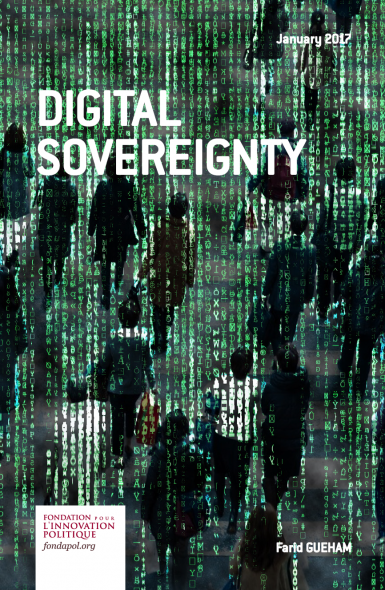

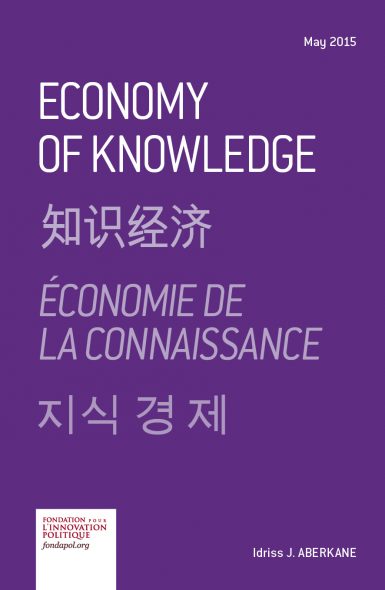


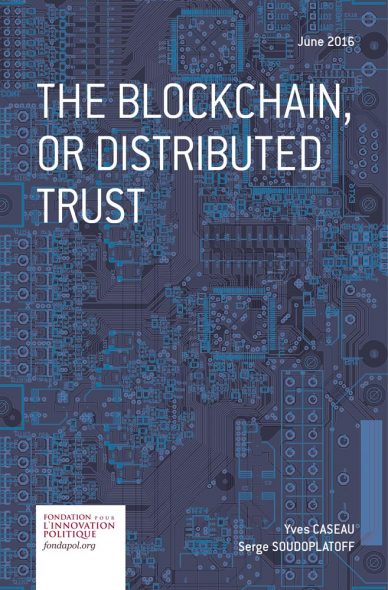






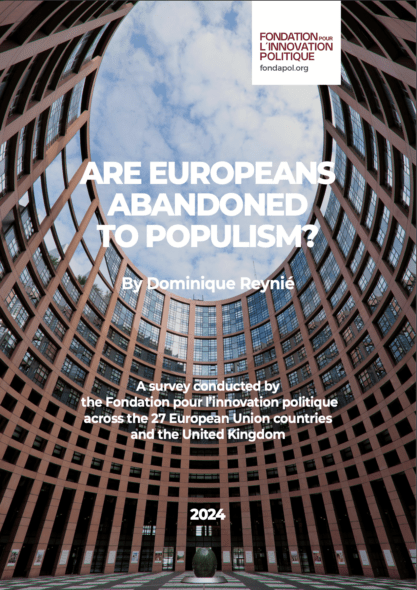
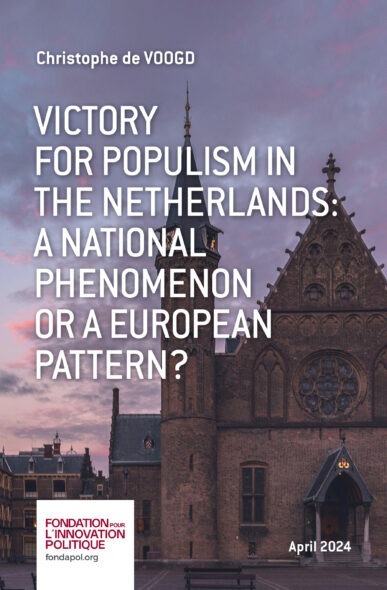



No comments.